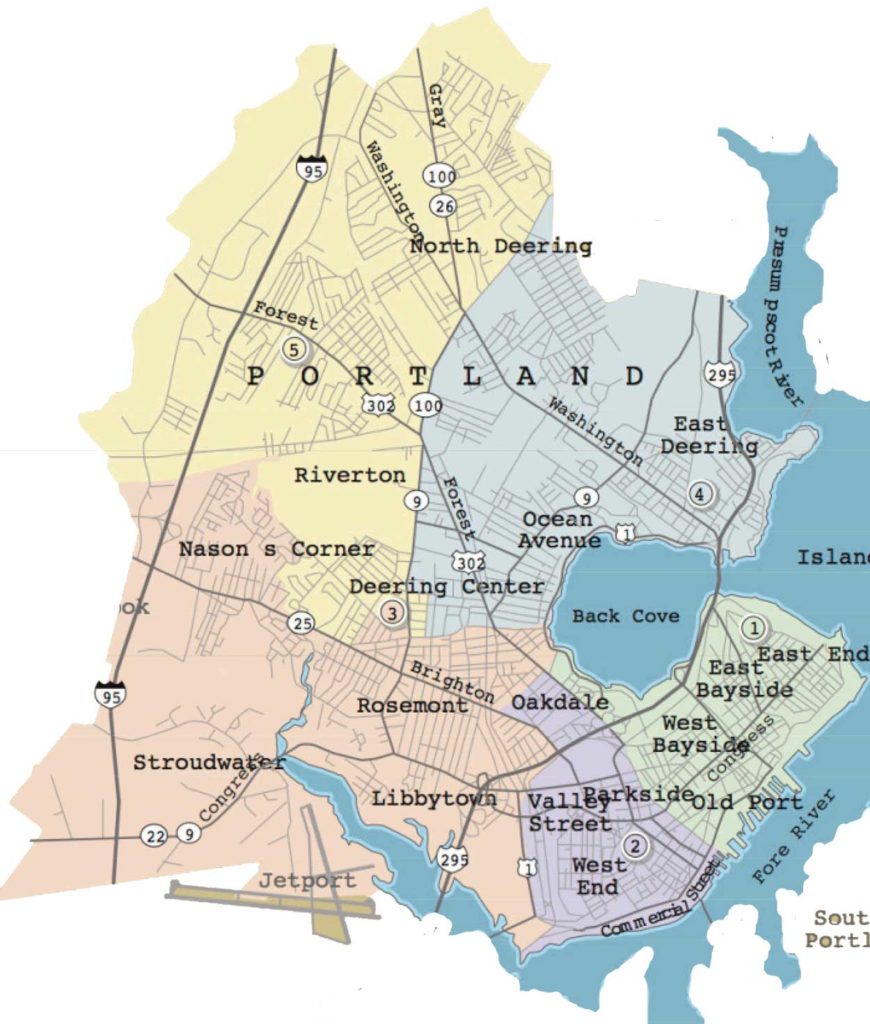The Portland Charter Commission has much to decide, but what they have already moved forward would transform municipal politics – if approved by voters.
By Tony Zeli
Although there is much to be decided, what the Portland Charter Commission has already chosen to advance would be transformative. They have supported more city councilors, universal resident voting rights, clean elections, and more. The commission continues to convene weekly to meet their deadlines. They must submit a preliminary report to Portland City Council by May 9th and a final report by July 11th. Their recommendations in the final report would go before voters in November.
More City Councilors
The Portland Charter Commission approved a proposal to increase the size of the Portland City Council to a total of twelve seats by creating new, smaller city districts.

Currently the city council has a total of nine seats. The mayor holds one seat. Another three seats are at-large, and at-large councilors can live anywhere in the city and are elected by voters of every district. The other five are district seats. District councilors must live within the district and are elected only by voters in the district.
On the current map, districts for Portland City Council are larger than districts for the Maine House of Representatives. So, a state rep in Portland might represent a neighborhood or two. On the other hand, a city councilor may represent four or five neighborhoods. For instance, District 2 covers the West End, Parkside, St. John-Valley, and Oakdale-USM neighborhoods.
As proposed, the charter commission’s recommendation adds four additional district seats. As such, the city council becomes a twelve-member body: three at-large councilors and nine district members.
Why More City Councilors?
According to the literature reviewed by the charter commissioners, smaller districts can increase connection to the neighborhood and lead to more diversity in representation. Commissioners also noted that with more councilors there would be more people to do the work and serve on council committees.
Representation is an issue with resonance for Portlanders who live on the islands of Casco Bay. Currently, District 1 covers the islands along with Munjoy Hill, East Bayside, and the Old Port. Under the recommended charter change, the city council would redraw the district maps. They could give the islands their own representation. Also, they could consider placing demographically diverse districts such as Parkside or Bayside in their own districts.
Of course, with twelve members there is the possibility of council votes ending in a tie. Generally, a tie would be a losing proposal. Consider, a tied vote that happened at the charter commission. The proposal to increase city council pay (currently an annual stipend set at less than $7,000) failed with a 6-6 vote. Another possibility, the charter commission could recommend that the executive mayor preside as a council president who can break ties – similar to the Vice President who presides over and breaks ties in the Senate.
(As of print, the commission has not decided on a recommendation for a governance model. But all proposals still under review include a mayor who runs an executive branch separate from the legislative city council body. Also, still to be decided is whether the school board would grow to twelve members.)
Universal Voting Rights
The charter commission voted to move forward with a recommendation for universal resident voting rights. The proposal grants all legal residents of voting age the right to vote in municipal elections and on municipal referendums regardless of citizenship status.
At this stage, the commission approved a proposal that the commission’s attorney Jim Katsiaficas will draft into formal charter language. However, attorney Katsiaficas advised the commission that the proposal is illegal under Maine law. The commission decided to seek a second opinion. They will vote again on the final charter language at a future meeting.
Clean Elections
The charter commission approved a proposal for clean elections, establishing a public fund to provide campaign financing for qualifying candidates who reject traditional financing. The proposal tasks the city council with drawing up the details of how the program would be designed and implemented.
The final costs are unknown, but an estimate provided by Commissioner Marpheen Chann puts the cost of a municipal clean elections program in Portland for the first fiscal year at approximately $287,734. That cost represents the paid staff person the charter proposal directs the council to hire.
Participatory Budgeting
The approved participatory budgeting proposal directs the city council to develop a process where residents can direct a portion of the city budget either through direct proposal or vote.
Upcoming Meetings
Portland Charter Commission meets weekly in April on Wednesdays starting at 6:00 p.m. The charter commission conducts meetings via Zoom. For more information, visit the city website at https://portlandmaine.gov.
Expect meetings to run for four or five hours as the commission rushes to present a preliminary report to the city council by May 9th. Their final report goes before the council on July 11th. All recommendations from the charter commission will go before voters for ultimate approval in November.
Tony Zeli is publisher and editor. Reach him at thewestendnews@gmail.com.





